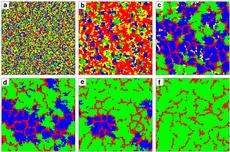Moralists have the last laugh

Over-fishing, tax evasion, freeriding: the Tragedy of the Commons happens again and again. A computer model now offers new insights into the way our society functions.
If someone is a freerider, he is behaving uncooperatively, thus cheating passengers who buy a ticket. Thus, an honest public transport user might ask, why he should pay, while others travel at his expense. If this kind of antisocial behaviour spreads, even the most honest passenger will be tempted to start freeriding.
Tragedy on a large scale
The individual is in a social dilemma: in the short term he can profits from egoistic behaviour, since he can use communal benefits without making an appropriate contribution. As a result, however, a system based on cooperative behaviour is easily corrupted. Eventually, the quality of the public transport service suffers, and cooperation can finally collapse, because there is a great temptation to end up better off than others. Sociologists call this the “Tragedy of the Commons”. It also happens in the over-fishing of oceans, tax evasion, insurance fraud, or in the abuse of social welfare systems.
To avoid the exploitation to social investments, ticket inspectors, courts, tax authorities or the police punish anyone who does not obey the rules. However, individuals can also sanction uncooperative behaviour themselves. Thus the question is: what are conditions under which cooperative behaviour in a community becomes established in a self-organized way?
Cooperators encounter freeriders
Dirk Helbing, Professor of Sociology at ETH Zurich, and other researchers have now created a new model based on game theory with which they can simulate how to overcome the Tragedy of the Commons and how to explain human behaviour in social systems.
In this model, the scientists allow four behavioural types to come into conflict: in addition to cooperative individuals (“cooperators”), there are “defectors” who live at their expense of others, called “freeriders (of first order)”. “Moralists”, who cooperate and also punish freeriders, are in the game as well. “Immoralists” punish freeriders although they behave anti-socially themselves. In Helbing’s “game”, it is assumed that the punishment is greater than its cost. In addition, the individuals interact in two spatial dimensions and imitate others, who are more successful than themselves, i.e. they copy their behaviour.
Freeriders succeed
If the individuals encounter randomly chosen interaction partners, freeriders get the upper hand again despite the punishment option. As punishing uncooperative behaviour generates costs, the moralists cannot spread, while cooperators initially profit from their punishment efforts. From this point of view, cooperators are “second-order freeriders”. They eventually undermine the punishment efforts of moralist, so that freeriding can spread again in the end.
Forming groups as a recipe for success
To the scientists’ great astonishment, a completely different result emerges when individuals interact in space with neighboring individuals. The computer simulations reveal that like-minded people aggregate in groups and segregate themselves from others who behave differently. Therefore moralists do no longer need to compete with cooperators saving sanctioning costs. Both, moralists and cooperators rather battle with the freeriders. If punishing strong enough, moralists do better than cooperators, since they can counteract anti-social behaviour.
Nonetheless the moralists have a difficult start. By forming groups, however, they can overcome freeriders, while these exploit cooperators. As a consequence, cooperators eventually turn into moralists, who can keep freeriders under control. “The conflict ends with a ‘He who laughs last, laughs at the best effect’ for the moralists,” says Helbing.
Moralists profit from black sheeps
If a couple of freeriders randomly appear in the system, moralists succeed even faster. “Black sheep support the triumph of moralists,” says the professor of sociology. No one expected this effect to emerge incidentally from the model, although it is well-known from reality.
The decisive factor for these discoveries is that the individuals do not interact with randomly chosen individuals, but with a limited number of neighbours, colleagues, friends or family members. In contrast, if the four behavioural types are randomly mixed, i.e. without forming groups, the game ends with the Tragedy of the Commons.
Under special conditions, moralists and immoralists can also form an “unholy alliance”. If the costs for the punishers are low and the penalty for uncooperative behaviour is moderate, the two groups can only succeed together. In this case, both the freeriders and cooperators disappear.
A pluralist society instead of a standardised one
Helbing stresses that the purpose of his model is to gain a better understanding of certain processes in our society, but is not intended as template to design social systems. He is convinced that “an excessively normative society does not function well, it must be pluralistic. If everyone acts in the same way, the system cannot adapt to changes of their environment quickly enough.” Helbing thinks freedom and tolerance are preconditions to ensure that societies remain flexible and adaptable. Therefore he says it is a good idea to create conditions that promote the self-organisation of society. New developments in business and culture that determine a country’s success require a creative climate. “That is often forgotten, especially in difficult times.” Then there is strong public call for law and order, but that only contributes to a society’s rigidity. The professor of sociology stresses that “It is more likely to be counterproductive. In many cases it makes everything worse.”
More information: Helbing D, Szolnoki A, Perc M, Szabó G, 2010 Evolutionary Establishment of Moral and Double Moral Standards through Spatial Interactions. PLoS Comput Biol 6(4): e1000758.
Provided by ETH Zurich
















